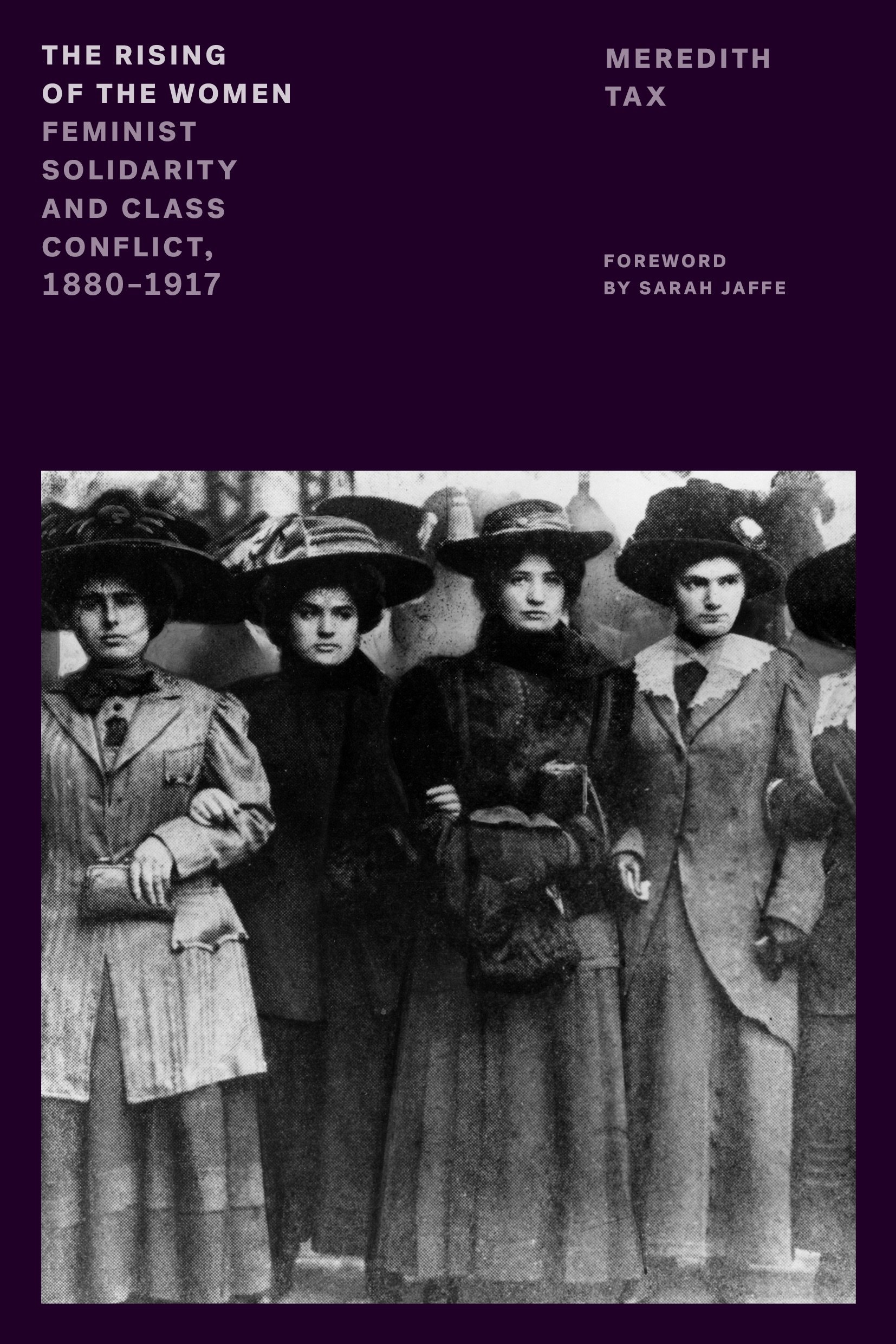
Bread and roses loom large in activist and author Meredith Tax’s biography. She cofounded the early women’s liberation group of that name in l969, going on to cofound CARASA (Committee for Abortion Rights and Against Sterilization Abuse) in 1977, chair PEN American Center’s Women’s Committee in 1986, and spend the last thirty years fighting gender-based censorship and the rise of fundamentalism, among other radical acts. Tax recounts her own moving life story in The Feminist Memoir Project: Voices from Women’s Liberation, edited by Rachel Blau DuPlessis and Ann Snitow (Three Rivers Press, l998), in a piece aptly titled “For the People Hear Us Singing / Bread and Roses! Bread and Roses!”
In 1980, Tax wrote The Rising of the Women: Feminist Solidarity and Class Conflict to celebrate the historical effort to create a socialist-feminist reality. While Gilded-Age radical feminists—including suffragists, unionists, “rebel girls,” anarchists, and socialists—were often at odds, the details of their struggle contained useful advice for anyone committed to continuing the process. In our current era of global crises and economic insecurity, its reissue in a third edition, with its important new introduction by Sarah Jaffe, is cause for hope as we seek to enhance our ongoing movements for dignity, union rights, civil rights, and human rights for all.
As Jaffe notes in her introduction, reiterating Tax, the “heart” of this book is the dialectical relationships of socialist women who “understood themselves as the human links between the feminist movement, the labor movement, and the socialist movement.” Although women’s labor history has been much amplified due to the efforts of women’s liberation activists of her vintage, Tax’s pioneering work is nonetheless filled with little-known facts and figures. Who knew, for instance, that the pioneering settlement-house visionary Jane Addams was also a union activist? Her alliance with and support for Mary Kenney O’Sullivan (who cofounded the Women’s Trade Union League) and the Ladies’ Federal Labor Union, comprised of typists, bookbinders, dressmakers, shoemakers, teachers, and other groups, transformed unionism first in Chicago and throughout the nation.
Meredith Tax’s emphasis on alliances across class lines and the significant “unity between housewives and working women” under some circumstances is complicated by the many moments of conflict over strategy and priorities between socialists, unionists, suffragists, radicals, and liberals. The alliance between factory worker Leonora O’Reilly and Lillian Wald of the Henry Street Settlement—and their shared commitment to workers’ education and the Women’s Trade Union League—is particularly heartening to read in 2022, when both education and unionism are under assault. Tensions within the alliance intensified, and the united front of women decreased over time. Still, it was a model to remember, as were the contributions of the Rebel Girls and the Industrial Workers of the World (IWW), founded in l905 by the Western Federation of Miners, members of the Socialist Party, and the Socialist Labor Party. Mary Harris, aka Mother Jones, established the Wobbly principles:
The working class and the employing class have nothing in common. There can be no peace as long as hunger and want are found among millions of working people, and the few, who make up the employing class, have all the good things of life.
Between these two classes a struggle must go on until the workers of the world organize as a class, take possession of the earth . . . and abolish the wage system. . . .
It is the historic mission of the working class to do away with capitalism. . . .
The IWW’s leaders and allies extended the range of IWW activism to include sexual freedom, birth control, and “equality in the home.” A reader might recognize the names of Elizabeth Gurley Flynn, Margaret Sanger, and Emma Goldman and still be inspired by the writer Agnes Smedley, born to a poverty-stricken miner who went on to write the feminist classic Daughter of Earth (originally published in 1929 and still available from the Feminist Press) and to support the Communist Revolution in China. So, too, might the reader recognize Marie Equi, who was openly a lesbian, contraceptive distributor, and, after conviction for sedition (she opposed World War I), the only lesbian and radical to be incarcerated at San Quentin.
The chapter “Socialists and Suffragists” details the limitations and racism of most suffragists and, by contrast, the insurgent power of the more inclusive Wage Earners’ Suffrage League (or Equality League), founded by New York radicals Charlotte Perkins Gilman, Florence Kelley, Lavinia Dock, Leonora O’Reilly, Rose Schneiderman, Crystal Eastman, Inez Milholland, and Clara Lemlich. (For more on these radicals, read Joanna Scutts’s brilliant new book, Hotbed: Bohemian Greenwich Village and the Secret Club that Sparked Modern Feminism [Seal, 2022].) Unlike the IWW, the Socialist Party supported suffrage, and the details here are fascinating.
Meredith Tax concludes with stirring words to dramatize the Massachusetts textile workers’ strike of l9l2 in Lawrence, which gifted us with James Oppenheim’s famous song “Bread and Roses,” from which some of my favorite lines are:
As we come marching, marching, we bring the greater days.
The marching of the women means the rising of the race.
No more the drudge and idler . . .
But a sharing of life’s glories. Bread and roses! Bread and roses!
Why republish The Rising of the Women today? Tax argues that this history gives us the information we need to get where we need to be. After all, this was a moment when women workers confronted hostile, sexist men (in the trades, union leadership, and government) and myopic middle-class feminists. These women looked to one another to forge a socialist-feminist ethos, refusing to accept that women’s rights (to vote, to birth control, to a living wage) were subordinate to the class struggle. Life in 2022 remains a sometimes overwhelmingly bleak struggle, and so we read books like The Rising of the Women to propel our activist journey—shoulder to shoulder, hearts open, fists high!

